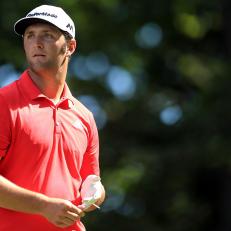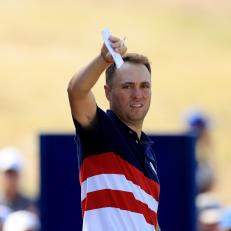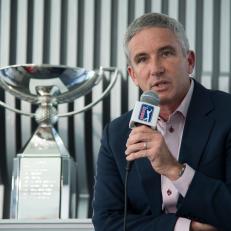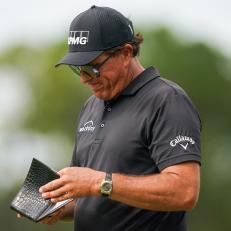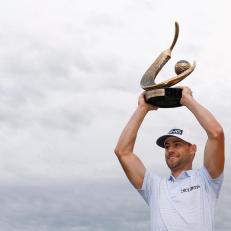The 13 Most Telling Revelations In New Book On The PGA Tour
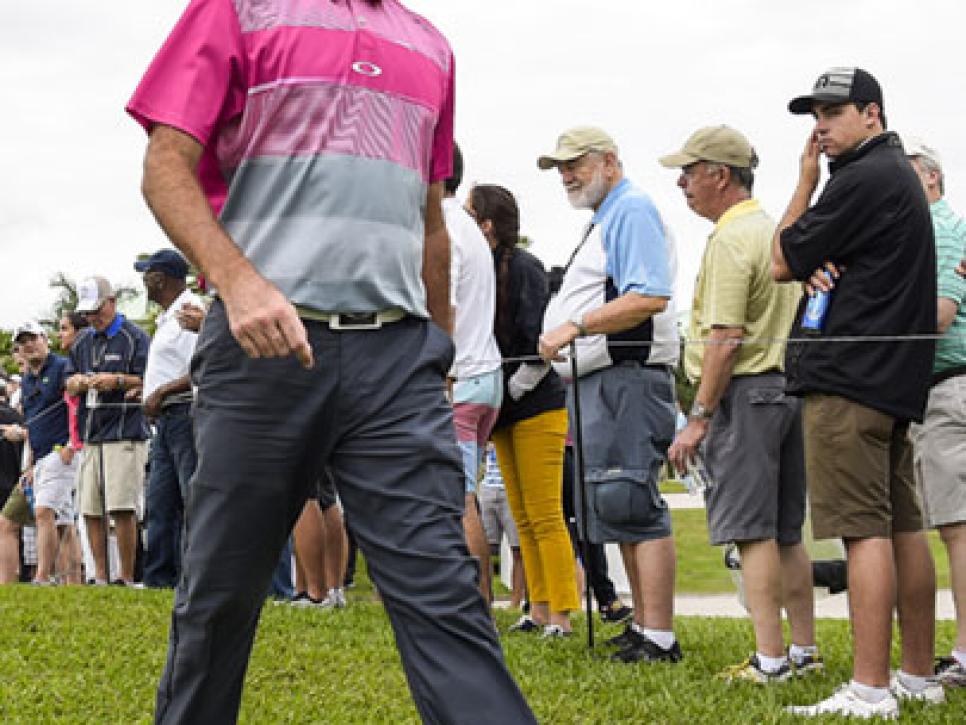
Bubba Watson is portrayed as a complicated, polarizing figure.
"There are two Bubbas, and they exist side by side, engaged in an endless power struggle," Ryan writes. The first is a real life cartoon character -- fun-loving, God-fearing, with enough talent to capture his second Masters title with relative ease. The second can be petulant, defensive and not entirely beloved by his fellow tour players -- including former teammates at the University of Georgia. "Bubba's never been friendly with Georgia players, and none of us really have a good relationship with him," fellow Bulldog Brendon Todd tells Ryan.
Jason Day's rise to fame came by way of a troubled childhood.
Day was so poor growing up his first golf club was a 3-wood his father pulled out of the town dump. His father died of stomach cancer when he was 11, and Day, Ryan writes, "went off the rails ... Young as he was, he became an alcoholic. He brawled in school and became sullen." It wasn't until Day was taken on by an Australian golf coach, Colin Swatton, that he found his footing as a person and a golfer. Swatton is still Day's coach and caddie today.
Patrick Reed alienated teammates at two different colleges.
Ryan's reporting on Patrick Reed, which preceded the release of his book, has already caused a stir in the golf world -- in part because of allegations from unnamed sources that Reed cheated in college. In addition to an earlier incident at the University of Georgia, Ryan said Reed also ran afoul of teammates at his next stop, Augusta State. When he was suspended at the start of one season, "the cause of the suspension -- confirmed by multiple sources -- didn't surprise those who knew him back in Athens: accusations by teammates that he had shaved strokes in two qualifying events." Reed has denied the reports.
Matt Every is the rare tour pro who says exactly what he's thinking.
In the sugarcoated world of the PGA Tour, Every, the two-time winner at Bay Hill, brings a refreshing candor. "It pisses me off when people write, 'Oh, that guy, I can't believe he'd say something like that, he should be privileged to play on the PGA Tour!'" Every tells Ryan. "Like I got f--ing picked out of a lottery. I mean, I've worked my ass off to be here. It's not like they handed me this spot, you know."
Jordan Spieth really is that mature.
Hard as Ryan looked for cracks in the now 21-year-old Spieth's polished facade, he couldn't find any. "He speaks with the wisdom and perspective of someone with fifty years of experience, and he never seems to deviate," Ryan writes. When trying to nail Spieth down for an interview, the writer suggests walking with the golfer during a pro-am round to protect him from mindless small talk with his amateur partners. Actually, Spieth countered, "I thoroughly enjoy the pro-ams, no matter what the other guys say."
Augusta National definitely isn't for everyone
As a relative outsider to golf, Ryan wasn't smitten by the annual home of the Masters in the way others in the game are. "There's something deeply disturbing and anti-democratic about the whole operation, and the club represents almost everything that's archaic and exclusive about golf," Ryan writes. The author presents a laundry list of unsettling elements -- from the club's vigilant monitoring of the TV broadcast to even why there are no squirrels visible on the property.
Rickie Fowler's small breach of etiquette in the NCAAs once enraged an opponent.
Ryan writes favorably about Rickie Fowler -- about his humble beginnings in the game, about how he's more down-to-earth than his flashy image suggests. But Ryan also describes one instance while at Oklahoma State when Fowler ticked off an opponent. Playing in a quarterfinal match in the NCAAs against Brian Harman and the University of Georgia, Fowler had walked off the 15th green while Harman was still playing and failed to retrieve the flagstick. Harman was furious. "I'm about to kick this guy in the teeth," Harman told Georgia coach Chris Haack, and he delivered, birdieing the last three holes to win the match and end Oklahoma State's season. Fowler turned pro soon after.
Rory McIlroy can't shake the complicated politics of Northern Ireland.
"For years, McIlroy tried to keep his cultural identity separate from his public image. That would be a very simple thing for most golfers, but for a kid from Northern Ireland, the effort alone was remarkable," Ryan writes. The book details McIlroy's difficult existence trying to rise above the fray that has torn Northern Ireland apart for generations -- and has impacted his own family. Ryan writes about a family member, Joe McIlroy, a Catholic who moved into a Protestant neighborhood in the 1970s and was later gunned down by Protestant paramilitaries.
Dustin Johnson's mysterious leave of absence
From the beginning, Johnson referred to it as a "leave of absence," but who did he think he was fooling? Given its timing -- knocking him out of the PGA Championship, FedEx Cup playoffs and Ryder Cup -- it was obvious Johnson's July 31 decision to step away from the game (as everyone understood for a failed drug test) wasn't all together voluntary. The tour's insistence that Johnson had not been suspended only perpetuated the semantic charade created by its "byzantine" drug policy, one that Ryan picks apart as making all parties involved look foolish at best and disingenuous at worst.
Why Sergio can't win the big ones
At 34, the Spaniard appeared to ditch his boorish ways in 2014 and replaced them with a new trait: humility. What didn't change, however, was Garcia's difficulty finishing off golf tournaments. When he held a three-stroke lead on Rory McIlroy entering the final round of the WGC-Bridgestone Invitational, it still felt inevitable he would find a way to lose. And it was. What is it with Sergio when the lights shine brightest? Ryan points back to mistakes made early in Garcia's career that created a "poisonous pessimism" in big-time events. In turn that led to more mistakes, which fueled more pessimism, and so on.
The quiet cruelty faced by those who struggle to remain on Tour
Everybody, notes Ryan, has something on the line in the final regular-season event, the Wyndham Championship in Greensboro, but not everyone walks away happy with the result when 10 months worth of work hangs in the balance of four frightful rounds. Faced with a 48-foot birdie putt on the 72nd hole that would get him in a playoff for the tournament title, Heath Slocum raced it six feet by, then missed the comebacker, abruptly relegating him to playing in the Web.com Tour Finals Series just to retain his PGA Tour card. Arguably the only outcome more sickening is when you can't control your own destiny, as Kevin Foley learned when he is knocked out of the last spot in the Web.com Finals by two late birdies from Doug LaBelle II.
Victor Dubuisson is one mysterious dude.
The 23-year-old Frenchman had a breakout season in 2014. Yet when asked about his background, the enigmatic Dubuisson frequently responded with misleading rather than helpful details. Initially he said that he finished school at age 10 and lived by himself as a teenager, an intriguing story that proved false. "The man was a sphinx," Ryan writes, "and arranging the puzzle pieces of his life would prove to be a huge challenge." It took a year of digging before Ryan could finally unmask Dubuisson's past when he connected with Victor's estranged father, Alban, a former professional basketball player.
Tom Watson's blunder-filled reign as Ryder Cup captain
Maybe Phil Mickelson threw his captain under the bus after the Americans' disappointing finish at Gleneagles, but Watson didn't help himself much during Ryder Cup week. Ryan points out repeated times in which the veteran whom the PGA of America was convinced would end the Americans' losing streak went about deflecting responsibility for various poor choices by using his players as a shield. It showed how Watson rarely let his team be part of the decision-making process, the opposite of how McGinley so successful guided the European side. The contrast between the two men answered a fundamental question asked every Ryder Cup: do the captains matter? "Yes," writes Ryan. "Emphatically yes."






